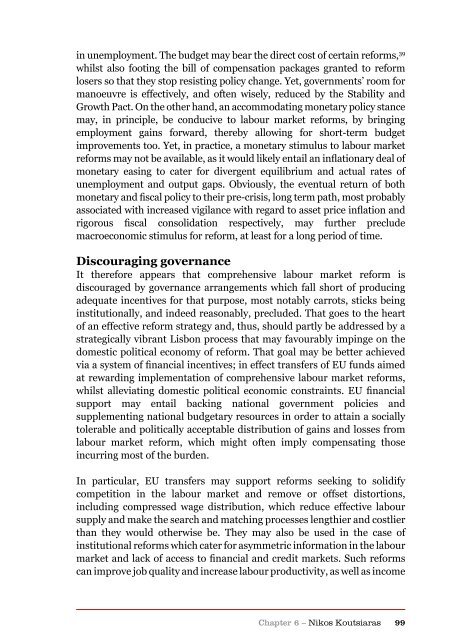Authors Iain Begg | Gabriel Glöckler | Anke Hassel ... - The Europaeum
Authors Iain Begg | Gabriel Glöckler | Anke Hassel ... - The Europaeum
Authors Iain Begg | Gabriel Glöckler | Anke Hassel ... - The Europaeum
You also want an ePaper? Increase the reach of your titles
YUMPU automatically turns print PDFs into web optimized ePapers that Google loves.
in unemployment. <strong>The</strong> budget may bear the direct cost of certain reforms, 39<br />
whilst also footing the bill of compensation packages granted to reform<br />
losers so that they stop resisting policy change. Yet, governments’ room for<br />
manoeuvre is effectively, and often wisely, reduced by the Stability and<br />
Growth Pact. On the other hand, an accommodating monetary policy stance<br />
may, in principle, be conducive to labour market reforms, by bringing<br />
employment gains forward, thereby allowing for short-term budget<br />
improvements too. Yet, in practice, a monetary stimulus to labour market<br />
reforms may not be available, as it would likely entail an inflationary deal of<br />
monetary easing to cater for divergent equilibrium and actual rates of<br />
unemployment and output gaps. Obviously, the eventual return of both<br />
monetary and fiscal policy to their pre-crisis, long term path, most probably<br />
associated with increased vigilance with regard to asset price inflation and<br />
rigorous fiscal consolidation respectively, may further preclude<br />
macroeconomic stimulus for reform, at least for a long period of time.<br />
Discouraging governance<br />
It therefore appears that comprehensive labour market reform is<br />
discouraged by governance arrangements which fall short of producing<br />
adequate incentives for that purpose, most notably carrots, sticks being<br />
institutionally, and indeed reasonably, precluded. That goes to the heart<br />
of an effective reform strategy and, thus, should partly be addressed by a<br />
strategically vibrant Lisbon process that may favourably impinge on the<br />
domestic political economy of reform. That goal may be better achieved<br />
via a system of financial incentives; in effect transfers of EU funds aimed<br />
at rewarding implementation of comprehensive labour market reforms,<br />
whilst alleviating domestic political economic constraints. EU financial<br />
support may entail backing national government policies and<br />
supplementing national budgetary resources in order to attain a socially<br />
tolerable and politically acceptable distribution of gains and losses from<br />
labour market reform, which might often imply compensating those<br />
incurring most of the burden.<br />
In particular, EU transfers may support reforms seeking to solidify<br />
competition in the labour market and remove or offset distortions,<br />
including compressed wage distribution, which reduce effective labour<br />
supply and make the search and matching processes lengthier and costlier<br />
than they would otherwise be. <strong>The</strong>y may also be used in the case of<br />
institutional reforms which cater for asymmetric information in the labour<br />
market and lack of access to financial and credit markets. Such reforms<br />
can improve job quality and increase labour productivity, as well as income<br />
Chapter 6 – Nikos Koutsiaras 99

















